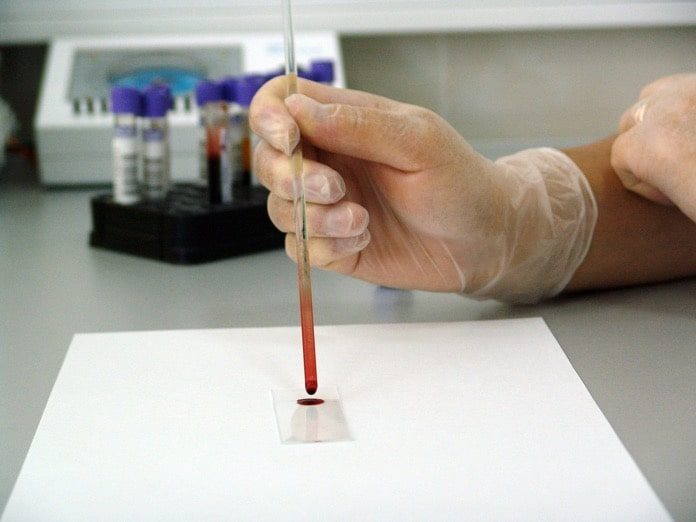Researchers in Chicago, USA investigated whether blood can be used to identify specific problems that need to be targeted in cystic fibrosis treatment.
Cystic fibrosis is a disease that primarily affects the lungs and digestive system. People with cystic fibrosis experience breathing problems, frequent lung infections, gradual deterioration of the lungs. Some patients also experience a loss of pancreatic function. There is no cure, but available cystic fibrosis treatment options allow most patients to live to early-to-mid adulthood.
Cystic fibrosis is a genetic disease resulting from mutations in a gene called CFTR. To have cystic fibrosis, a person needs to have two mutated copies of CFTR (one from each parent). There are many different mutant versions of CFTR. Some mutations lead to moderately reduced production or function of the CFTR protein, while others lead to almost no production or function.
People with cystic fibrosis show differences in what symptoms they have, how severe these symptoms are, and how quickly symptoms worsen. This variability makes treating cystic fibrosis with a standard treatment regime impractical. The different mutations patients carry can explain some of the variability in symptoms among patients with cystic fibrosis, but not all of the variability.
Recent research has focused on whether some of the additional variability in symptoms may result from differences in the levels of gene expression or the production of a gene product. Some studies have shown a relationship between whether or not a patient’s lungs are infected and expression levels of genes involved in airway immune response. However, previous research has not delved into how this relationship works or the dynamics of this relationship.
What might different gene expression levels mean?
In a study recently published in Physiological Genomics, researchers at the Stanley Manne Children’s Research Institute and the Ann & Robert H. Lurie Children’s Hospital of Chicago characterized differences in gene expression in white blood cells of cystic fibrosis patients. They used blood from 103 cystic fibrosis patients between the ages of 2-53 years (median age of 14), and 31 healthy controls between the ages of 6-38 years (median age of 16).
To determine what might cause these differences in gene expression in cystic fibrosis patients, they also cultured white blood cells from healthy individuals in blood plasma from cystic fibrosis patients. White blood cells are bathed in plasma in the body, and molecules present in the plasma may signal changes in these cells.
The results suggest that airway infection and resulting inflammation may lead to different patterns of gene expression in cystic fibrosis patients through the production of immune response molecules. This conclusion is supported by two major findings:
- Culturing white blood cells from healthy individuals in plasma from cystic fibrosis patients induced changes in gene expression mimicking expression in cystic fibrosis patients.
- There was a relationship between immune response molecules in the blood of cystic fibrosis patients and different patterns of gene expression in white blood cells.
Of the 1,094 genes differentially expressed in cystic fibrosis patients, 51 are involved in pancreatic function and 224 are related to a particular bacterial infection. The researchers also found a relationship between differential expression of some of these genes and pancreatic function in cystic fibrosis patients.
Early indicators of physiological problems can improve cystic fibrosis treatment
This study shows that certain gene expression patterns in white blood cells from cystic fibrosis patients may indicate a response to airway infection or predict problems with pancreatic function at an early stage. This would mean that doctors can perform regular safe, non-invasive blood tests in cystic fibrosis patients to monitor any changes in gene expression indicating early infection or pancreatic problems and intervene with treatment.
However, the authors acknowledge that there are limitations to this study, including a small number of participants for some groups. They also did not examine what components of blood plasma other than immune response molecules may affect gene expression in white blood cells. In addition, because they did not include control patients with other lung diseases, the researchers cannot be sure that changes in gene expression they observed are specific to cystic fibrosis.
The researchers hope to perform additional studies to identify individual genes or sets of genes whose expression levels correspond to symptom presence, severity, and progression in cystic fibrosis patients. They also plan to examine the effects of antibiotics and other medications on expression levels of these genes. With further research, cystic fibrosis treatment may target very specific gene expression changes in individual patients. This could lead to longer lifespans and higher quality of life for many people with cystic fibrosis.
Written by Melissa H. Wong, MSc
Reference: Levy H, Jia S, Pan A, et al. Identification of molecular signatures of cystic fibrosis disease status using plasma-based functional genomics. 2018. Physiol Genomics DOI:10.1152/physiolgenomics.00109.2018



